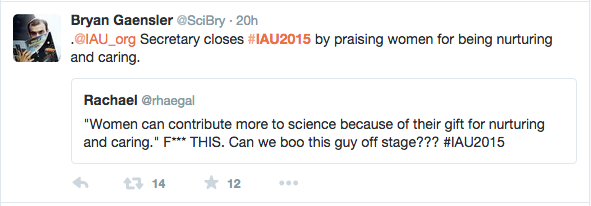The closing ceremony for the International Astronomical Union (IAU) General Assembly marks not only the culmination of a two week science conference, but also the official change of the Executive Committee.
Speeches were made thanking the 2012 - 2015 committee for their work and issuing grandiose promises of a bright future in the years ahead. Yet, the message taken from the 2015 meeting would not be one of hope, but of outrage.
Photo by twitter user @pritisha_prisha
The issue was a speech given by the incoming General Secretary, Piero Benvenuti, from the University of Padua in Italy. Benvenuti began well enough, as he noted that the four incoming IAU officers were "one Italian and three women."
While not exactly comparing like-with-like (I believe Italians can be female), Benvenuti was correct in promoting this as an important milestone. Female professional astronomers have long struggled to reach senior positions, resulting in an even-ish gender split in graduate school and a male-dominated faculty at many institutions. The reasons for this form a multi-headed hydra, but systematic sexism plays a substantial role, as highlighted in the recent #GirlsWithToys and #DistractinglySexy scandals. Having 3/4 of the IAU's most recognised members be women therefore gives hope that younger researchers will have a fairer playing field.
A hope that died with Benvenuti's next comment.
He was looking forward to working with his female colleagues --Benvenuti explained-- since women have a special gift for caring and education.
A gender-determined talent that is apparently far more important to Benvenuti than the lifetime of work and perseverance that made these scientists leaders in their field. To use a different analogy, Benvenuti's comment is akin to delightedly welcoming Roger Federer (winner of 17 grand slam tennis titles) onto your sports team, because the Swiss always have the best fondue parties.
Unsurprisingly, this comment was not received with enthusiasm.






Of course, Benvenuti's fellow officers may be immensely nurturing, but I doubt that was why they were offered their current roles. Let's take a whirlwind tour of these three scientists:
Silvia Torres-Peimbert from the National Autonomous University of Mexico, is incoming IAU President. Her research explores the composition of planetary nebulae; a misleading name that actually refers to the gas blown outwards by dying stars. The chemistry of this gas can tell scientists like Torres-Peimbert about the life the star has led. In 2011, Torres-Peimbert was awarded L'Oréal-UNESCO Awards for Women in Science, whose accompanying video saw her described as harbouring a 'warrior spirit'.
Ewine van Dishoeck from Leiden University begins her term as President Elect. Van Dishoeck's research looks at the very beginning of the star's life, examining the molecules that form in cold gas clouds that will become the nurseries for a new stellar population. She has been littered with awards, including the Gothenburg Lise Meitner Award for breakthrough discoveries in physics in 2014 and the Spinoza Prize in 2000, the highest scientific award in the Netherlands.
Maria Teresa Lago from the University of Porto has accepted the role as Assistant General Secretary. Her work sits in between van Dishoeck's stellar beginnings and Torres-Peimbert's death throws, to examine the evolution of action-packed young stars. Lago is also an immensely important figure in education, setting up the first bachelors, masters and PhD astronomy programs in Portugal. Her awards include the Henri Chrétien Award from the American Astronomical Society.
It was clear that Benvenuti did not mean his comments to be condescending. At the end of applauding his colleagues for their feminine attributes, he turned and bowed to them. This shows Benvenuti has not grasped the issues behind gender discrimination. And that's what makes this sad.
It is perfectly possible that Benvenuti meant his suggestion of female caring to be in addition to the obvious scientific achievements of his fellow officers. However, suggesting that gender dictates your skill set --positively or negatively-- is never complimentary and degrades the effort that goes into a long academic career.
The wording also implies that Benvenuti does not consider his female colleagues as equals. Equivalent, perhaps, but not to be judged by the same qualifications as men. Regardless of whether he thinks this or not, it demonstrates that Benvenuti does not understand the struggles against sexism that the female body of the IAU must navigate. And that's a problem for an IAU leader.
What needs to happen now is Benvenuti should apologise and show he understands clearly his mistake. In the notorious Tim Hunt case, his main error was not showing that he comprehended why his casual words had caused so much pain. Let's not make the same mistake twice.
[Update 20-08-2015: Professor Benvenuti has written a response to those concerned about the content of his speech here. In this, he apologises that his remarks offended some and that he is honoured to be working with his fellow officers.]




